- Home
- Tom Sharpe
Riotous Assembly Page 17
Riotous Assembly Read online
Page 17
‘I have a great admiration for Miss Hazelstone,’ said the Kommandant coldly. ‘She was a remarkable woman and Zululand will be the poorer for her passing.’
‘You speak of her as though she were already dead,’ said the Bishop, whose thoughts about mortality were markedly more frequent since he had moved into Bottom. ‘I suppose in a way she has gone to a better life.’
‘She won’t be leaving there until she is dead,’ said the Kommandant grimly. ‘By the way, your trial starts next week so if you have anything to say in your defence you had better start thinking about it now,’ and the Kommandant had gone away convinced that Jonathan Hazelstone deserved his fate.
The Bishop, left alone in his cell, decided that there was really nothing he could do to add to the confession he had made. It seemed to him a perfectly adequate defence in itself. Nobody on earth could possibly believe he had committed the crimes he had admitted to, and he doubted if any but an expert on High Church ritual could disentangle criminal offences from ecclesiastical practices. No judge worth his salt could ever condemn him for latitudinarianism. The Bishop lay down on the mat on the floor of his cell which served as his bed and looked forward to the verdict he was sure would free him.
‘It probably won’t even come to that,’ he thought cheerfully. ‘The Judge will throw the prosecution case out of court.’
As usual with the Bishop of Barotseland’s prognostications events were to prove him entirely wrong. The Judge chosen to hear the case was Justice Schalkwyk, whose mother had died in a British concentration camp and who was noted both for his deafness and his loathing for all things British. The attorney for the defence, Mr Leopold Jackson, was likewise handicapped physically by a cleft palate which made his speeches almost inaudible, and who was in any case known for his tendency to defer to the authority of judges. He had been chosen to conduct the defence by the accused man’s heirs, distant cousins who lived in a poor section of Cape Town and who hoped by speeding the course of justice to avoid any further unwelcome publicity which would besmirch the family name. Mr Jackson was only allowed to see his client a few days before the trial began, and then only in the presence of Konstabel Els.
The interview took place in Bottom and was marked by an almost complete misunderstanding from the start.
‘You thay you’ve thigned a confethion. Motht unfortunate,’ said Mr Jackson.
‘It was made under duress,’ said the Bishop.
‘It wasn’t,’ said Els. ‘It was made in here.’
‘Under dureth,’ said Mr Jackson. ‘Then it won’t thtand up.’
‘I don’t expect it to,’ said the Bishop.
‘It can’t,’ said Els. ‘Confessions never do.’
‘How wath it forthed out of you?’
‘I was made to stand up.’
‘You weren’t,’ said Els. ‘I let you sit down.’
‘So you did,’ said the Bishop.
‘Tho it wathn’t made under dureth,’ said Mr Jackson.
‘I told you just now. It was made in here,’ said Els.
‘It was partly made under duress,’ said the Bishop.
‘Don’t listen to him,’ said Els. ‘I know where it was made. It was made in here.’
‘Wath it made in here?’ asked Mr Jackson.
‘Yeth,’ said the Bishop, lapsing into legal jargon.
‘There you are. I told you it was,’ said Els.
‘There theemth to be thome confuthion,’ said Mr Jackson. ‘What did you confeth to?’
‘Genuflexion with a rubber prick,’ said Els hurriedly forestalling lesser crimes.
‘Genuflecthion with a what?’ Mr Jackson asked.
‘He means a rubric, I think,’ said the Bishop.
‘I don’t. I mean a rubber prick,’ said Els indignantly.
‘Thoundth a thtrange thort of offenth,’ said Mr Jackson.
‘You’re telling me,’ said Els.
‘I thought thith wath a capital cathe,’ said Mr Jackson.
‘It is,’ said Els, ‘I’m enjoying it no end.’
‘Genuflecthing ithn’t a crime under Thouth African law.’
‘It is with a rubber prick,’ said Els.
‘There were some other crimes in my confession,’ said the Bishop.
‘Thuthch ath?’
‘Murder,’ said the Bishop.
‘Lesbianism,’ said Els.
‘Lethbianithm? Thatth impothible. A man can’t commit lethbianithm. Are you thure you’ve got the right cathe?’
‘Positive,’ said Els.
‘Would you mind allowing my client to thpeak for himthelf?’ Mr Jackson asked Els.
‘I’m just trying to help,’ said Els aggrieved.
‘Now then,’ Mr Jackson went on, ‘ith it true that you have admitted to being a lethbian?’
‘As a matter of fact, yes,’ said the Bishop.
‘And a murderer?’
‘It does seem strange, doesn’t it?’ said the Bishop.
‘It thoundth fantathtic. What elth did you confeth?’
The Bishop hesitated. He did not want Mr Jackson to object to his confession before it was read out in court. Everything depended on the absurdity of the document and Mr Jackson did not look like a lawyer who would understand that.
‘I think I would prefer the case to go forward as it is,’ he said, and excusing himself on the ground that he was tired, ushered the attorney out of the cell.
‘Thee you on the day,’ Mr Jackson said cheerily, and left Bottom.
It was not due to Mr Jackson, however, that Jonathan Hazelstone’s confession never reached the court in its unabridged version. It was thanks rather to the conscientiousness of Luitenant Verkramp who, eager for praise, had sent a copy of the confession to BOSS in Pretoria. The head of the Bureau of State Security found the document on his desk one morning and read the thing through with a growing sense of disbelief. It wasn’t that he was unused to reading extravagant confessions. After all the Security Branch existed to manufacture them and he could boast that it had a reputation in this respect second to none. One hundred and eighty days in solitary confinement and days of standing up without sleep while being questioned had the tendency to produce some pretty damning admissions from the suspects, but the confession that Verkramp had sent him made all previous ones look positively tame.
‘The man’s out of his mind,’ he said after ploughing through a catalogue of crimes that included necrophilia, flagellation and liturgy, but it was not certain which man he was referring to. After a conference with leading members of the Government, BOSS decided to intervene in the interests of Western civilization incarnate in the Republic of South Africa and, using the powers bestowed on it by Parliament, ordered the suppression of nine-tenths of the confession. Judge Schalkwyk was to try, convict and condemn the prisoner, with no opportunity to appeal, on charges of murdering one Zulu cook and twenty-one policemen. No other charges were to be proffered and no evidence prejudicial to State security was to be presented in court. Grumbling furiously, the old judge was forced in accordance with South African law to obey. Jonathan Hazelstone was to be hanged, there must be no miscarriage of justice, but he was after all to be hanged for a lamb.
The trial took place in Piemburg and in the very courtroom in which the accused’s father had made such a great reputation.
‘The old order changeth,’ Jonathan murmured to his lawyer as he took his seat in the dock. Mr Jackson was not amused.
‘It hardly becometh you to make mockery of my defect,’ he said. ‘Bethideth from what I have heard you would do better to thay “The wortht ith yet to come.”’
Mr Jackson for once was right. The discovery that his confession had been expurgated came as the real shock of the trial to the Bishop. In the adjournment that followed the announcement that he was only to be tried for murder, Jonathan consulted with his attorney.
‘I thould plead inthanity. It theemth your only chanth,’ was Mr Jackson’s advice.
‘But I’m entirely in
nocent. I had nothing to do with the murder of twenty-one policemen.’
‘I darethay but it ith an unfortunate fact that you have confethed to killing them.’
‘I was forced to. Why on earth should I want to murder them?’
‘I have no idea,’ said Mr Jackson. ‘My clienth motiveth are alwayth a mythtery to me. The point ith that the evidenth againtht you theemth pretty concluthive. You had the opportunity and the weaponth were found in your pothethion. Furthermore you have admitted in a thigned confethion to having killed them. I thuggetht you change your plea from not guilty to guilty but inthane.’
‘I’m not inthane,’ shouted the Bishop.
‘I haven’t come here to be inthulted,’ said Mr Jackson.
‘I’m thorry,’ said the Bishop. ‘I mean I’m sorry.’
‘I thall change the plea,’ said Mr Jackson finally. ‘Inthanity it ith.’
‘I suppose so,’ said the Bishop.
‘It’th better than being hanged,’ said Mr Jackson. They went back into the courtroom.
The trial proceeded rapidly. By the end of the afternoon the prosecution’s case had been presented and Mr Jackson had made no attempt at a reasoned defence. He was relying on the leniency of the court in the face of the accused’s obvious insanity.
In his summing-up to a jury handpicked from close relatives of the murdered policemen, Judge Schalkwyk spoke with a brevity and degree of impartiality quite unusual for him.
‘You have heard it said,’ he mumbled, though it was certain that thanks to his own deafness he hadn’t, ‘by the prosecuting counsel that the accused committed these crimes. You have seen the accused’s confession with your own eyes, and you have heard the defence counsel’s plea that his client is insane. Now you may think that there is something to be said for the hypothesis that a man who murders twenty-one policemen and then signs a confession saying that he has done so is manifestly not of his right mind. It is my duty however to point out to you that to plead insanity in the light of the overwhelming evidence against him is not the action of an insane person. It is a highly rational action and one that indicates a degree of perception only to be found in an intelligent and healthy mind. I think therefore that you can disregard the question of insanity altogether in your deliberations. You need only concern yourselves with the matter of guilt. There is in my mind no shadow of doubt that the defendant committed the murders of which he is accused. He possessed, as we have heard from the expert evidence presented by the prosecution, both the opportunity and the means. He was found in possession of the murder weapons and in the act of disposing of them. His wallet and handkerchief were found at the scene of the crime, and he has given no adequate explanation of how they got there. Finally, he has admitted in a signed confession that he was responsible for the murders. I think I need say no more. You and I both know that the defendant is guilty. Now go away and come back and say so.’
The jury filed out of the courtroom. Two minutes later they returned. Their verdict was unanimous. Jonathan Hazelstone was guilty of murder twenty-one and a quarter times over.
In passing sentence Judge Schalkwyk allowed himself to depart from the lack of bias he had shown in his summing-up. He took into account a previous conviction which concerned a motoring offence. The convicted man had failed to give adequate notice of intention to make a left-hand turn at an intersection and as the Judge pointed out, this threatened the very existence of the South African constitution which was based on a series of consistent moves to the right.
‘You are a threat to the values of Western civilization,’ said the Judge, ‘and it is the duty of this court to stamp Communism out,’ and he ordered the prisoner to be taken from the court and hanged by the neck until he was dead. He was about to leave the courtroom when Mr Jackson asked to have a word with him in private.
‘I would like to draw your Honour’th attention to a privilege which belongth to the Hazelthtone family,’ he gurgled.
‘The Hazelstone family doesn’t have any privileges any more, I’m glad to say,’ said the Judge.
‘It’th a prerogative of long thtanding. It dateth back to the dayth of Thir Theophiluth.’
‘Long standing, what do you mean? There’s no question of his standing long. He’ll be hanged shortly.’
‘I mean the privilege of being hanged in Piemburg Prithon. It wath conferred on the family for perpetuity,’ Mr Jackson tried to explain.
‘Mr Jackson,’ the Judge shouted, ‘you are wasting my time and that of this court, not to mention that of your client who has little enough left of it as it is. Perpetuity means the quality of preserving something from oblivion. The quality of the sentence I have just passed is in intent quite the opposite. I think I need say no more, and I should advise you to do the same.’
Mr Jackson made one last effort ‘Can my client be hanged in Piemburg Prithon?’ he shouted.
‘Of course he can,’ the Judge yelled. ‘He has to be. It’s a long-standing privilege of the Hazelstone family.’
‘Thank you,’ said Mr Jackson. As the court was cleared Jonathan Hazelstone was taken back to his cell in a state of numbed shock.
17
It was with something of the same sense of shock that Governor Schnapps learnt that it had fallen to him to preside over the first hanging Piemburg Prison had seen for twenty years. Not that he was in the least squeamish or upset at the thought of having to attend an execution. He had in his time as a prison officer attended any number of hangings, mostly unofficial ones carried out by black convicts anxious to escape once and for all from the régime he had prescribed for them, but none the less hangings and the prospect of having at least one official execution to his credit filled him with a feeling of satisfaction. The sense of shock stemmed from quite other considerations.
There was for instance the question of the gallows which had not been used for twenty years except as a convenient place in which to store odds and ends. Governor Schnapps inspected Top himself and, from the little of it he could see across the buckets and garden rollers that were packed inside, came to the conclusion that the scaffold was in no shape to hang anyone. The same might well be said of the prospective executioners. The old warder volunteered to advise whoever was chosen as hangman but adamantly refused to attend the execution in person on the grounds that the Death House was unsafe, and the Governor’s attempts to persuade one of the other warders to accept the job of executioner met with no success. No one it seemed was anxious to join Jonathan Hazelstone on his last walk if this entailed climbing the rickety steps up to Top.
In desperation Governor Schnapps telephoned the official executioner in Pretoria to ask him if he could come down to Piemburg for the day but the executioner was far too busy.
‘Out of the question,’ he told Schnapps, ‘I’ve got thirty-two customers that day and besides I never hang singles. I can’t remember when I last did one man. I always do mine in batches of six at a time and in any case I have my reputation to think of. I hang more people every year than any other executioner in the world, more than all the other executioners in the free world put together as a matter of fact, and if it once got about that I hanged a single man, people would think I was losing my touch.’
As a last resort Governor Schnapps raised the question of privilege with the State Attorney.
‘I can’t see why this man Hazelstone should be privileged,’ he said. ‘Everyone else is hanged in Pretoria. It seems wrong to me that a fellow who knocks off twenty-one policemen should be entitled to privileges which are denied to ordinary common-or-garden murderers.’
‘I’m afraid there’s nothing I can do about it,’ the State Attorney told him. ‘Judge Schalkwyk allowed the privilege to stand and I can’t alter his decision.’
‘But how did the Hazelstone family ever get the right to be hanged in Piemburg in the first place?’
The State Attorney looked up the records.
‘It dates from the speech made by Sir Theophilus at the opening of the prison in
1888,’ he told the Governor. ‘In the course of that speech Sir Theophilus said, and I quote, “Capital punishment and flogging are essential to the peace and tranquillity of Zululand. They confer upon the native races a sense of the innate superiority of the white man and in declaring this prison open I should like to say that it is my considered opinion that the very future of white civilization in this dark continent depends, one might almost say, hangs, on the frequent use of the scaffold we have been privileged to see here today. It will be a sad day for this country when the gallows trap falls for the last time and one that I trust no member of my family will live to see.” Unquote.’
‘All very commendable,’ said the Governor, ‘but I don’t see that it necessarily means that we have to keep the gallows for the exclusive use of the Hazelstone family.’
The State Attorney picked up another document. ‘Now here we have the statement of the late Judge Hazelstone made at the time all executions were transferred to Pretoria. The Judge was asked what he thought his father had meant in his speech. His answer was, I quote, “It’s perfectly obvious. The gallows and the Hazelstone family stand or fall together. My father believed and rightly believed that our family should set an example to Zululand. I can think of no finer example than that of having our own private gallows in Piemburg Prison.” Unquote. Pretty conclusive, don’t you think?’
Governor Schnapps had to concede that it was and returned to the prison still faced with the problem of finding an executioner.
In the end it was Konstabel Els who became the official hangman. The Konstabel was still happily contemplating how he was going to spend the reward money he had earned from the capture of Miss Hazelstone and was looking forward to the ceremony in the police drill hall when he would be presented with the cheque by the Commissioner of Police. He had decided it was worth the price asked by the taxidermist at the Piemburg Museum to have Toby stuffed.

 Blott on the Landscape
Blott on the Landscape Porterhouse Blue
Porterhouse Blue The Wilt Alternative:
The Wilt Alternative: The Great Pursuit
The Great Pursuit Ancestral Vices
Ancestral Vices The Midden
The Midden Vintage Stuff
Vintage Stuff The Throwback
The Throwback Grantchester Grind:
Grantchester Grind: Wilt on High:
Wilt on High: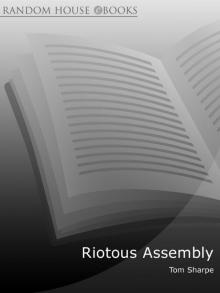 Riotous Assembly
Riotous Assembly Indecent Exposure
Indecent Exposure The Gropes
The Gropes Wilt in Nowhere:
Wilt in Nowhere: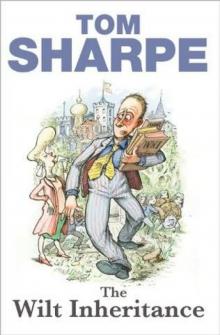 The Wilt Inheritance
The Wilt Inheritance Wilt:
Wilt: The Wilt Alternative
The Wilt Alternative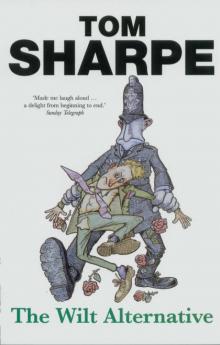 The Wilt Alternative w-2
The Wilt Alternative w-2 Grantchester Grind
Grantchester Grind Wilt on High
Wilt on High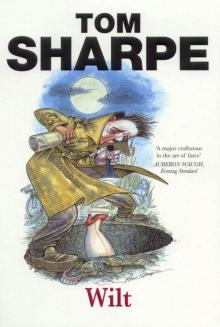 Wilt w-1
Wilt w-1 Wilt
Wilt The Wilt Inheritance (2010)
The Wilt Inheritance (2010) Wilt in Nowhere
Wilt in Nowhere Wilt in Nowhere w-5
Wilt in Nowhere w-5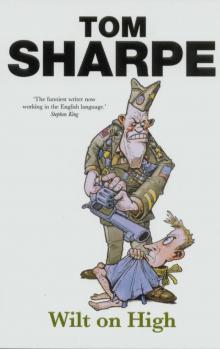 Wilt on High w-3
Wilt on High w-3